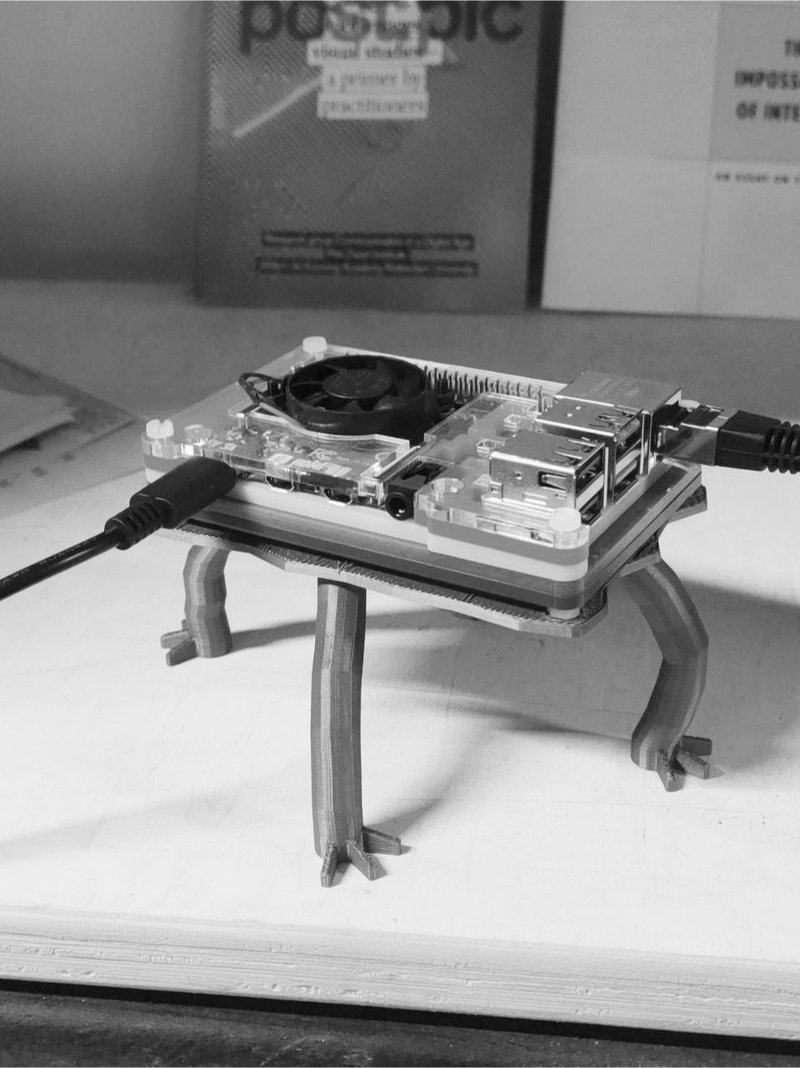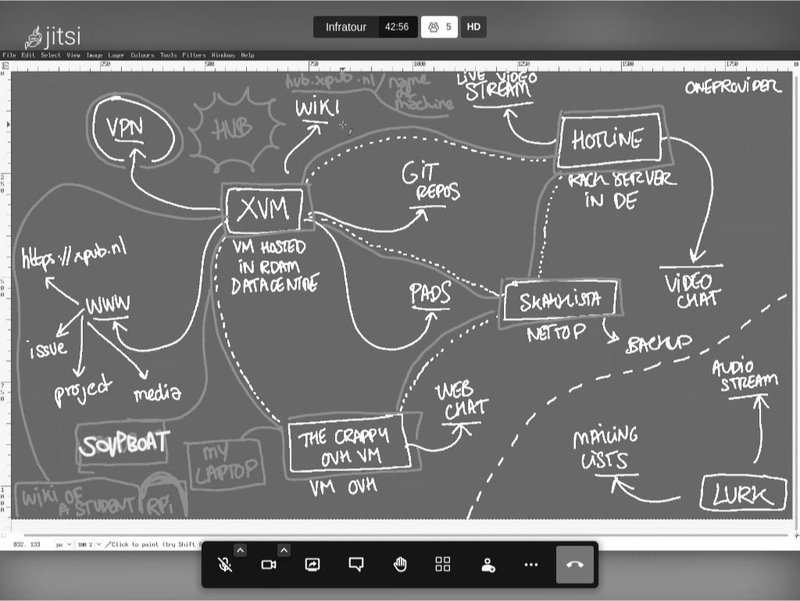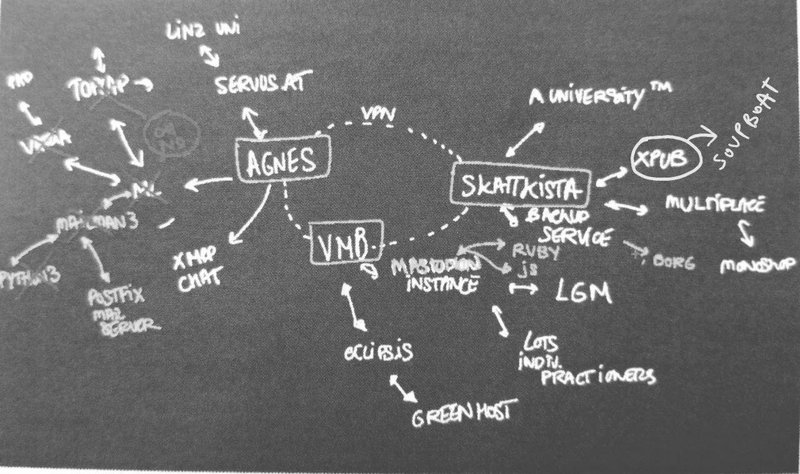chapter
Clumsy legs
Clusmy legs
annotationannotationdfgsdglsklsdklfs
March 10th, 2023.
A friend just sent a message in the group chat — Soupboat1 has now legs. And then: — 4x faster now.
I can’t stop laughing.

Back in September 2021, when at the beginning of my masters I had the very first experience of setting up a web server on a raspberry pi 4, which then became “the Soupboat”, I admit I could barely understand how digital networks worked in practice. I could only see in front of me a small single board computer attached to the network of the school via an Ethernet cable. The setup was accompanied by a so-called “infra-tour” that mapped the technological infrastructure to which Soupboat was connected. This included another much bigger server located in a datacenter in Rotterdam, which also hosted a Wiki, a Jitsi, an Etherpad2 and the VPN (Virtual Private Network) through which our local web server could be visible from the rest of the internet, bypassing the protected network of the school. I’ve been told not to worry if all of that wouldn’t make sense on the spot. What was essential to understand in that moment was that the little palm-sized printed circuit board was in fact a shared computer which we (my classmates and I) could make use of collectively, that it could be fragile and that it would need to be taken care of by us as a group.

Later on, by learning and practicing some basics of programming, it gradually became clear to me that the answer to the question “what is a server?”, would actually call into question the subject-object relation that the use of a server entails, generating more and more questions, tongue twists, and brain teasers like “what is the server for and who decides it?”, “who creates the services inside the server and which other services the server relies on in turn?”, “who can be served?”, and “who makes sure that the server keeps serving?”. In relation to such questions the ideas of “collective use”, “fragility”, and “need of care” began to assume concrete weight and meaning beyond the material dimension of a web infrastructure made of motherboards, cables and fragile electric switches. I slowly recognized how both self-hosting and the use of FLOSS (Free Libre Open Source) software in education, and in the cultural field in general, are also a political choice encompassing the continuous negotiation of collaboration, freedoms and power dynamics. Take for example the massive use in education of proprietary and commercial software like Microsoft and Adobe. Meant to be used in business-oriented working environments or creative industries, they shape a type of learning calibrated on values like optimization, competition, and hyper specialization among others. It should be well known how these huge trans global companies transform schools into markets where “Software as a Service” (SaaS)3 can be sold as necessary productive tools, going far beyond the scope of pedagogy and learning. Providing totalizing quick solutions to its users, GMAFIA4 legitimate their products as the best competing innovation. Saas is a model which prevents its users from articulating a systemic and more critical perspective on its digital infrastructure, much less imagining how the latter could be collectively inhabited without having to compromise on the security, the surveillance and the commodific
ation of the users’ flow of data.
Self-hosting and free software could be a great pedagogical challenge instead. I’m not only talking about the technical knowledge required to run and maintain a web server. When I think for instance of the Soupboat, which now looks like a slow, trouble-making and goofy little critter with its 3d printed clumsy legs, I think of it as a learning and exploratory tool. Yes, it’s a very specific type of learning based on code and software, but it is capable of questioning, validating or completely cracking the social reality that gathers around it, even, and especially, if such reality is not entirely made by individuals with a computer science background or other geeks.
With a bit of attention, the web server is able to reveal and activate the extremely delicate ecosystem of infrastructural relations entangling communities, institutions, and economies on different scales, where power dynamics are constantly negotiated. Differently than SaaS, whenever Soupboat is down, — because of software updates, because the network of the school changed its IP address, because someone would modify its .config file with some errors, because it simply crashed with no apparent reason and the “Is-anyone-in-studio-to-check-if-Soupboat-has-been-unplugged?” would be the SOS message in case of emergency, seeking for the activation of the whole group in order to verify what was the cause of malfunctioning — it would bring visibility not only to its demanding infrastructure, but also to anything else in its surroundings that has established relations of co-dependency with it. When things break and interrupt the flow, it is necessary to slow down, which brings into question the need to take accountability for such relations.
From my standpoint, several important take aways arise from the act of running and, most of all, maintaining independent digital infrastructures. On one level, they have the potential for mediating community awareness through the collective maintenance of such infrastructure as a social shared space, and as a common resource. On another level, the collaborative maintenance of self-hosted free software altogether would facilitate a practical hands-on critique of individualizing commercial tools for a commodified education, thus valorizing a learning process re-calibrated on matters like free cooperation, repair, attention for infrastructural and social well-being, and the practice of agency through constraints. But how to sustain the modus operandi of such critique beyond pedagogy and beyond the boundaries of the educational institution?
Issues of this kind have been largely discussed by artist and researcher Femke Snelting who voices, among others, the urgency of opposing fairer, solidary and feminist technologies to the predatory logic of an internet hegemonized by GMAFIA. In her essay “Infrastructure solidarity” she writes:
[[quote | “We are trained to expect smooth and seamless on-line experiences that require the kind of deep pockets, longevity and vision that politics chose not to engage with and public institutions fail to provide. It has become near impossible to imagine a different type of life with digital tools, let alone to dream of solidary digital infrastructures that can be collectively owned, maintained and used […] Infrastructural solidarity only starts with
[…][developing] relationships with technology that acknowledge vulnerability, mutual dependency and care-taking.” (2019, p, 45-47)]]

Zooming out from the Soupboat’s infrastructure a series of other cultural initiatives appear on the map through their web servers. Running and maintaining independent internet infrastructure in the cultural field is certainly a niche practice, nonetheless there are numerous cultural initiatives who decided to engage in such activity. Their
genealogy is the result of different histories from FLOSS (Free Libre Open Source) software to hack labs, from artist-run autonomous spaces to Cyber feminist groups, to name a few; they constitute such a rich and extremely heterogeneous constellation, that grouping them under a commonly accepted umbrella term would be already a great endeavor. Some of the recurring terms used to refer to them are: community network, collective infrastructure, feminist servers, art server, cultural datacenter or even community software. These may be inhabited by figures like activists, programmers, artists, designers, teachers, learners, amateurs, enthusiasts and other cultural workers who try to self-organize in solidarity around the “delicate balance, between becoming a service provider and providing much needed space for other experiences with technology.” (Snelting, 2021). Among these initiatives, for example, several Feminist Server Manifestos5 have been published with the idea of articulating a series of fundamental principles calling in for the creation of safer, situated, and more sustainable digital spaces, like “A feminist server [… T]ries hard not to apologize when she is sometimes not available” (2015).
Yet the effective implementation of these principles more than often conflicts with the actual possibility of being implemented. In practice, it seems really hard to introduce vulnerability, mutual dependency and care-taking as fundamental values for a working environment that is self-organized in the cultural field. These initiatives are embedded into a larger socio-political and economical context characterized by a general rise of the costs of life and by precarious working conditions. Within such reality, the livelihood of solidary digital infrastructure altogether is deeply affected by tighter and gradually more unsustainable relations with cultural funds promoting the financiarization of not-for-profit cultural projects, on top of a huge amount of affective and voluntary labor coming from their already overworked community. Nonetheless, the Feminist Server Manifestos inspired several cultural organization to gather in order to problematize the issues of maintenance and administration, and share practical knowledge around how to self-organize in solidarity without perishing.
Projects of these kinds include, for example, the initiative Digital Solidarity Networks, which “is an online shared listing of tools, practices and readings for digital solidarity”(Varia, 2020). The Transversal Network Of Feminist Servers (ATNOFS), which “engage with questions of autonomy community and sovereignty in relation to network services data storage and computational infrastructures” (ATNOFS, 2022). And other conversations about “Hosting with the others”, like the one that happened in the context of AMRO festival 2022 (Linz), and whose documentation has been published and redistributed in the format of a zine.
In the past months, these works have been of great inspiration for imagining a series of realistic examples of how the little world developed around the Soupboat could exist beyond its institutional and educational bubble. However, the socio-technical realism of those cultural initiatives seems to contradict their good intentions, revealing much of their vulnerability to burnouts and neglect, due to inadequate, if not complete lack of resources to sustain a satisfying infrastructural and social well-being. This brought me to contact some of the cultural initiatives mentioned above, and to join their ongoing conversations with the question: how to practice maintenance while trying to include practices of collective care, in forms of self-organization that deal with free, open source and self-hosted technologies?
Under the guide of Shannon Mattern’s writings, I embraced maintenance as “a theoretical framework, an ethos, a methodology, and a political cause” (Mattern, 2018). I started to organize a series of interviews, conversation and collective evaluations, playfully calling them “Boiler inspections”, in order to problematize the many difficulties and contradictions emerging from working in solidarity with self-hosting and free software in the cultural field. The following pages are part of the journal I’ve been writing along the ongoing process of prototyping and testing different formats of boiler inspection. Taking into consideration the contextuality of each organization as well as the intimate and subjective view that each individual brings to the organization they participate in. The observations collected during the inspections are hereby summarized and organized on the basis of common tropes that I suggest for a more specific zoom-in onto the issue of maintenance: radical administration, caregiving and hacking.
https://xpub.nl/
-
Soupboat is the name of a web server that has been set up in the context of the fine art and design Master called Experimental Publishing (XPUB), in Rotterdam, where self-organizing is encouraged along the focus “on the acts of making things public and creating publics in the age of post-digital networks”. ↩
-
Jitsi is a collection of free and open-source voice, video conferencing and instant messaging applications. Etherpad is an opensource, web-based collaborative real-time editor, allowing authors to simultaneously edit a text document. https://etherpad.org/. While Gitea is a hosting service for software development and version control. ↩
-
Software as a Service (Saas) is a centralized model of software distribution based on the Cloud ↩
-
GMAFIA is an acronym used to refer to the Big Tech: Google, Microsoft, Amazon, Facebook, IBM, Apple ↩
-
One version of “The Feminist Server Manifesto” was included in the publication Are You Being Served? (Constant, 2015), but there are different variations of the the same manifesto as result of workshops and research projects, like the “Whishlist for trans*feminsit servers”, URL:https://www.bakonline.org/prospections/a-wishlist-for-transfeminist-servers/ ↩